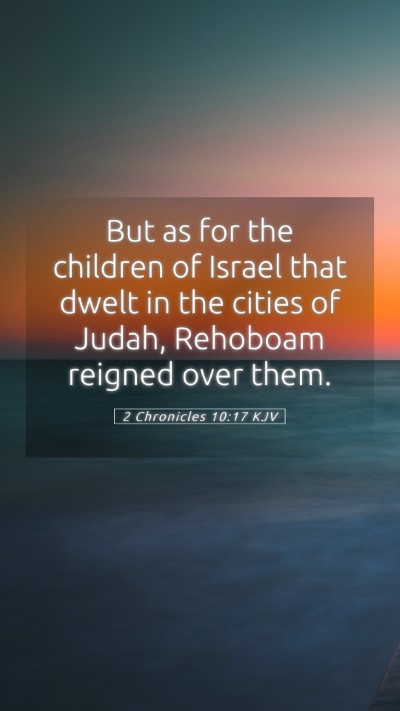Understanding 2 Chronicles 10:17
Verse: 2 Chronicles 10:17 (KJV) - "But as for the children of Israel which dwelt in the cities of Judah, Rehoboam reigned over them."
Overview
This verse marks a significant moment in the history of Israel, indicating the anointing of Rehoboam as king over Judah. It represents a turning point in the narrative following Solomon's reign and the eventual division of the kingdom.
Contextual Background
This passage comes after the death of King Solomon and the subsequent challenge to the new king, Rehoboam. As the son of Solomon, Rehoboam inherits both a great kingdom and the problems which accompany it. The narrative serves as a critical study on leadership, rebellion, and the consequences of decisions made by those in positions of authority.
Bible Verse Meanings
According to various public domain commentaries, the essence of 2 Chronicles 10:17 can be understood through different lenses:
-
Matthew Henry:
In his commentary, Henry explains that Rehoboam's reign signifies a departure from Solomon's covenant relationship with God, highlighting the separation of Judah from Israel as a symbol of divine judgment and the consequences of sin.
-
Albert Barnes:
Barnes discusses the territorial aspects, noting that while Rehoboam ruled over Judah, it underscores the geographical and tribal divisions that stemmed from the people's choice to forsake God’s commands and turn to their own devices.
-
Adam Clarke:
Clarke emphasizes that Rehoboam's reign, and the separation of his rule, reflects the critical choices made by the leaders that would ultimately shape the nation's future and its relationship with God.
Scripture Analysis
The verse is pivotal for understanding the broader narrative of Scripture. It not only details Rehoboam’s kingship but also introduces themes of conflict, leadership failure, and divine sovereignty. As noted in commentary, Rehoboam’s decisions lead the nation of Israel towards division and strife.
Historical Context
In the historical context, the reign of Rehoboam marks the end of a united monarchy. The decision-making processes that led to his rule are tragic reflections of human pride and the desire for power over the wisdom of God. The verse invites readers to contemplate the long-lasting effects of their choices and actions.
Application of 2 Chronicles 10:17
For today’s reader, the implications of 2 Chronicles 10:17 extend beyond mere historical record; they challenge us to examine our own leadership, both personally and within our communities. Rehoboam’s failure is a cautionary tale about listening to wise counsel versus following the desires of the populace.
Furthermore, it instills the understanding that God’s plans may unfold through the flawed systems of human governance, leading us to seek divine wisdom over human desire.
Bible Cross References
- 1 Kings 12:1-20 - The account of Rehoboam's ascendancy and the initial conflict with the northern tribes.
- 2 Chronicles 7:19-22 - God's warning to Solomon about the consequences of turning away from Him.
- Jeremiah 3:10 - Reflection on Israel's unfaithfulness and its eventual separation from Judah.
Conclusion
2 Chronicles 10:17 not only elucidates Rehoboam's reign but also serves as a critical point of reflection for modern readers. Through the insights gathered from esteemed biblical commentaries, we glean lessons about leadership, choices, and the historical narrative of Israel's divided kingdom. Engaging with this verse can enrich Bible study groups, enhance online Bible study resources, and provide lessons for personal application in today’s context.
Further Study Recommendations
To deepen your understanding of this passage and its implications:
- Participate in bible study groups to discuss leadership and accountability themes.
- Utilize bible study tools to explore related biblical texts and historical contexts.
- Engage with bible study lessons focused on the consequences of leadership decisions.


